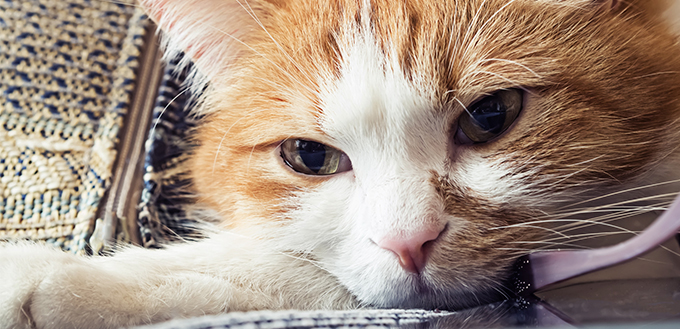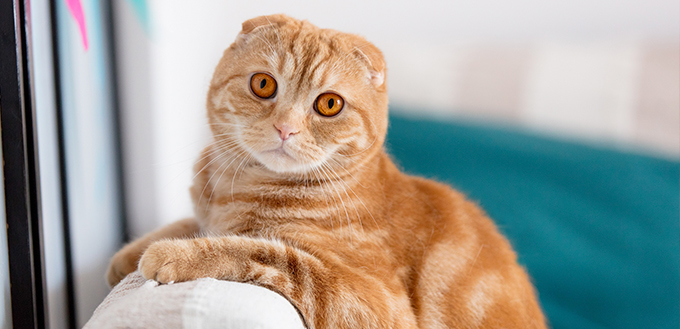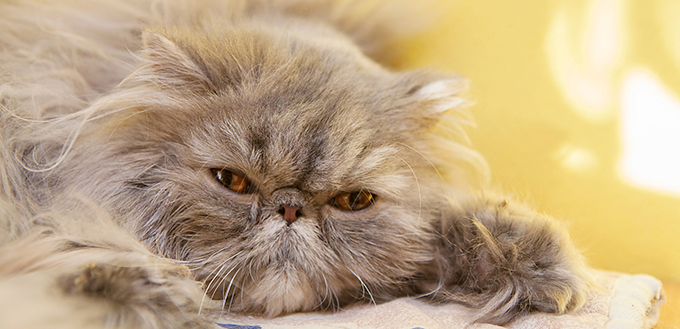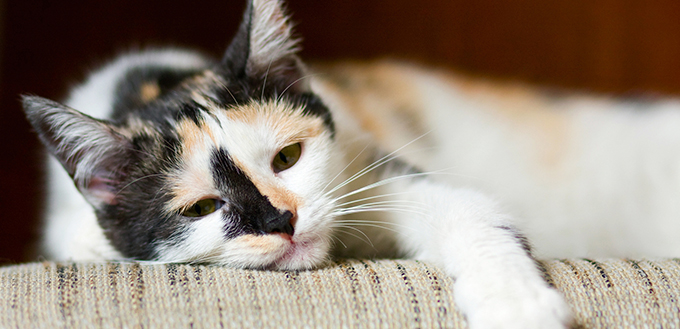It is a clear that mental illness is a growing issue for humans. After all, as many as 20% of adult Americans are thought to be struggling with their own mental health issues. But, what about our pets? Cats can be pretty mad, and entertaining, creatures, but are you sure that when you joke around that your cat is crazy, you aren’t on to something? Giving your cat their best life can already be pretty challenging, so how do you incorporate their mental health into this?

Understanding Mental Health
As with physical health, your mental health can be in either good shape or bad shape. Just as you could break a bone, catch or cold, or suffer from a health condition, you can suffer from trauma, have bad days, or struggle with a mental health diagnosis.
In humans, the concept of mental health encapsulates a huge variety of issues. Some of them are firmly physiological impacts on cognition, emotions and the mind, some of them seem to be predominately psychological, and others may be a mix of both.
Luckily, mental health awareness has risen sharply in recent years, bringing with it openness, solutions, yet also more questions. For example, can other animals suffer from mental health concerns?
This question won’t be fully answered for many years as there is a lot of research to undertake. However, using the research that has been done thus far, it is fairly safe to assume that the answer is ‘probably’.
Animals are often more complex and intelligent than we give them credit for, and this may result in certain emotional and psychological concerns. Thus far, for example, research has uncovered that orangutans can suffer from addiction, military dogs can suffer from a form of PTSD, and elephants have even been known to commit suicide.
Cats and Mental Illness
This is not to say that our cats suffer from the same mental conditions as we humans. Just as not all physical health issues are universal among animals, it is probable that mentally ill cats have their own mental health concerns to contend with. This means the most important question we should be asking is ‘What mental health problems could my cat face?’.
Currently, the answer to that question is very debatable, but there are at least three important cat mental health concerns that we are going to explore in detail in this article. These are:
- Anxiety
- Obsessive Compulsive Disorder
- Feline Hyperesthesia Syndrome
Hopefully more research will be done in the next few years that can further our understanding of our cats mental health. However, unfortunately, studying cats is particularly difficult, especially if you want to attempt any physiological understanding, such as through using an fMRI or behavior experiments, so let’s not hold our breath!
Cats and Anxiety
It has been proven that cats can suffer from stress, fears and anxieties. This is quite common and you have probably seen a version of it yourself as all cats get spooked. The severity of the fear often dictates how much of a problem it may be.
A fear or phobia can become a serious health concern when it causes the cat to lash out at others or put themselves in danger. It can also become a problem if your cat appears afraid of everything and is living in perpetual terror as stress shortens your cat’s lifespan.
If you are worried that your cat is suffering from a form of anxiety, whether it is a mild fear or a full panic attack, you should look out for any symptoms, note them down and talk to a vet. Symptoms may include:
- Trembling
- Withdrawal, hiding and attempts to escape
- Reduce activity
- Sudden, and potentially dangerous or harmful, actions
- Diarrhea or constipation
- More frequent grooming
- Lesions caused by more frequent grooming

Causes of Cat Anxiety
As well as noting down symptoms, it is worth trying to understand what is the cause of any episode you encounter, and writing that down. If your cat consistently displays any symptoms without an obvious stimuli, they may be suffering from anxiety. If their symptoms always follow a specific noise, they may have a more direct phobia of that noise.
Understanding what is causing your cat’s anxiety is key to finding a solution, so you will want to provide as much information as you possible can to your vet. Potential causes of anxiety that you may want to investigate include:
- Specific loud noises or sights
- Current illnesses or conditions, particularly if they are causing pain
- Previous illnesses or traumatic experiences, particularly if you have a rescue cat
- A lack of socialization from a young age, particularly if your cat did not have any social exposure before the age of 14 weeks old
- Separation anxiety, most likely brought on by instability, such as frequent re-homing or abandonment
- Nervous system changes in older cats, which make them more vulnerable to viral infection and toxicity
You can also try to use this information for cat mental health preventative care. As cats can be prone to anxiety, it is worthwhile to think about socializing them with other kittens at a young age, thinking about the positioning of the furniture in your home, and generally making their environment and routine as friendly, stable and secure as possible.
Treating Cat Anxiety
As with many health problems, treatment depends on the cause. Your vet will want to check for a number of biological and environmental explanations for the behavior, such as brain disease, and lead poisoning. They will do this using a blood test.
Once it is confirmed that your cat is suffering from anxiety, there are a few potential steps available to you:
- Your vet may prescribe your cat medication
This medication may be help to soothe your cat and can help if you are worried your cat is going to hurt themselves. While medication can be a good solution for some situations, many veterinarians will not recommend relying solely on the medication for treatment. It can take weeks for medication to take effect.
- You can explore behavioral conditioning
It is very possible to research and implement your own behavior conditioning training on your cat, but you can also turn to an expert for help. Behavior conditioning essentially comes down to rewarding desired behavior in order to encourage it.
This means you must avoid rewarding your cat when they are having an episode of panic or anxiety, as you could accidentally reinforce their panic as a desired behavior. Reward calmness, and do not use negative reinforcement, also known as punishment, to deter their panic. This will only add another dynamic to the fear response.
You may also like our article on Cat Calming Collar.
- Try desensitization and counter-conditioning
This is another method that may require the help of an cat behaviorist if you do not feel comfortable attempting it on your own. Desensitization involves subjecting your cat to a controlled form of their negative stimulus, while counter-conditioning actively attempts to redirect their response to from negative to positive.
For example, you may aim to replace your cat’s fear response of hiding when it becomes dark with sitting. You would do this by first training your cat to sit on command by rewarding them with a treat and affection when they successfully exhibit this behavior, and then ordering them to sit as soon as the lights are turned off. Reward them for sitting instead of hiding and quickly turn the lights back on. Repeat.
Read here our article on the Best Calming and Anti-Anxiety Products for Cats.

Cats and Obsessive Compulsive Disorder
A more specific disorder that may be familiar to you is Obsessive Compulsive Disorder (OCD), and research has found that cats can suffer from this challenging mental health issue. On reflection, it shouldn’t be that surprising that cats can suffer from OCD as it is quite closely linked to anxiety.
OCD in cats is often a coping mechanism for anxiety that manifests itself in repetitive behavior that appears to have no purpose. For example, they might pace around the home or chew on fabric. Left alone, these coping mechanisms can become habits.
If you suspect your cat is struggling with OCD, you should watch out for these symptoms:
- Excessive grooming
- Repetitive pacing
- Sucking
- Repetitive vocalizations
- Fabric chewing
- Any other repetitive, compulsive behavior that does not seem to have a purpose
Causes of Your Cat’s OCD
As we’ve already alluded to, anxiety is a closely tied to OCD. However, it is too simplistic to view anxiety as the sole cause of your cat’s OCD. There are a number of issues at work that could contribute to compulsive or repetitive behavior. These include:
- Stress, which makes OCD more common in indoor cats due to stress caused by confinement
- Anxieties, as outlined above
- Mental disorder
- Owner’s response, such as paying attention to them, which may reinforce behavior
It is still unclear if age or gender is a factor in cases of cat OCD, but it is thought that certain breeds are more susceptible than others. Asian breeds, such as Siamese cats, are more likely to display OCD behaviors, specifically fabric chewing and repetitive vocalizations.
Treating Your Cat’s OCD
As always, you should take your cat to the vet if you suspect they are struggling with OCD behaviors. Your vet will examine them to rule out other causes, and you will need to provide them with a detailed account of their behavior and history. Once underlying illnesses are ruled out using blood tests, urinalysis, and a possible skin biopsy. They may need to go for an, appropriately named, CAT scan to see if there are any neurological abnormalities to cause concern.
When your vet is able to confirm that your cat is suffering from OCD, treatment is similar to helping a anxious cat. As above, your vet may offer your cat medication, and you can also consult a cat behavior specialist. However, the best thing you can do to help a cat who has OCD is to improve their environment:
- Create a more structured timetable for your cat’s day and, if you can, remove unpredictable elements of their day
- Do not reward the compulsions
- Do not turn to confinement and do not attempt to punish compulsive behavior as this increases stress levels
- To help with compulsive pacing, do not reward your cat by allowing them outside when they start to pace. Instead, learn to anticipate when they start to pace and redirect their behavior by letting them out before it starts.
- If they are not already spayed or castrated, doing so can help with repetitive meowing
- Try to find ways to redirect your cat’s attention before compulsive behavior starts
Feline Hyperesthesia Syndrome
Last but not least, we have twitch-skin syndrome, which is occasionally mistakenly called feline hypertensia syndrome, leading people to mistake it for an issue related to hypertension. Rather than anything to do with blood pressure, this syndrome is a physiological mental health issue that affects the nervous system. However, it is still not very well understood.
FHS appears almost as a seizure in which your cat suddenly appears to attack itself. An episode can last up to a few minutes and may constitute of:
- Twitching
- Violent tail movements
- Biting or licking of their tails, pelvic limbs and back
- Dilated pupils
- Agitation
- Erratic behavior

Causes and Treatment of Twitch-Skin Syndrome
The causes of FHS are still unknown because the condition is so rare. However, it is widely thought that it may be triggered by a cat’s environment and that nervous or hyperactive cats are more susceptible.
If you suspect your cat has FHS, your vet will be able to rule out any other causes of their seizures, but they will need a detailed description of the episodes and their history in order to do that. Your vet will test for skin conditions, brain damage and other diseases that could result in similar symptoms.
As the condition is so unknown, treatment is not certain, but there has been some success with certain medications in suppressing the symptoms. It is worthwhile to reduce any stresses in their environment to try and prevent triggering episodes, and a behavior specialist may be able to help them redirect their stress behaviors.
Your Cat’s Mental Health
The truth is that you shouldn’t worry too much about your cat’s mental health. As we have already noted, just as your cat does not have the same physiology as you, they do not necessarily have the same thought processes. Be careful not to anthropomorphize your cat by attributing them with human characteristics.
It can be unhealthy for pets to be treated as humans when they need stability and structure in their environment. Arguably, anthropomorphism may well be a leading cause of anxiety in cats. Although, of course, much more research is needed on this.
As always with any health issue, look out for symptoms and consult with a vet, rather than speculating using your knowledge of human mental health concerns. There are real concerns tied to cat anxiety and behavior, and if you suspect that your cat’s quality of life is suffering in any way, your veterinarian is likely to be able to offer some advice.
Sources:
- Anxiety and Compulsive Disorders in Cats, PetMD
- Dr. Wailani Sung MS, PHD, DVM, DACVB, Can Your Depression Affect Your Pet?, VetStreet
- Why Is My Cat Sad?, WebMD
Note: The advice provided in this post is intended for informational purposes and does not constitute medical advice regarding pets. For an accurate diagnosis of your pet's condition, please make an appointment with your vet.





